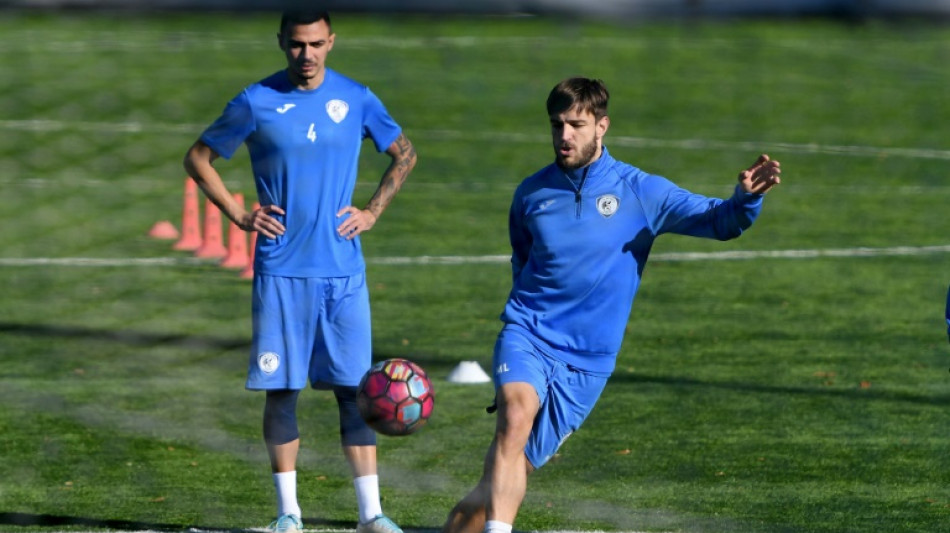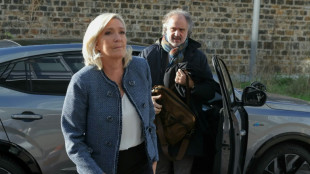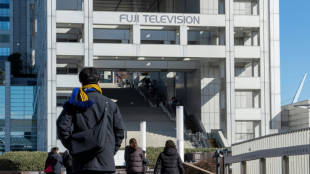
-
 Three talking points ahead of clay-court season
Three talking points ahead of clay-court season
-
French court hands Le Pen five-year election ban

-
 Probe accuses ex J-pop star Nakai of sexual assault
Probe accuses ex J-pop star Nakai of sexual assault
-
Japan leads hefty global stock market losses on tariff woes

-
 Saka 'ready to go' after long injury lay-off: Arteta
Saka 'ready to go' after long injury lay-off: Arteta
-
Ingebrigtsen Sr, on trial for abusing Olympic champion, says he was 'overly protective'

-
 Tourists and locals enjoy 'ephemeral' Tokyo cherry blossoms
Tourists and locals enjoy 'ephemeral' Tokyo cherry blossoms
-
Khamenei warns of 'strong' response if Iran attacked

-
 France fines Apple 150 million euros over privacy feature
France fines Apple 150 million euros over privacy feature
-
UK PM urges nations to smash migrant smuggling gangs 'once and for all'

-
 Thai authorities probe collapse at quake-hit construction site
Thai authorities probe collapse at quake-hit construction site
-
France's Le Pen convicted in fake jobs trial

-
 Chinese tech giant Huawei says profits fell 28% last year
Chinese tech giant Huawei says profits fell 28% last year
-
Trump says confident of TikTok deal before deadline

-
 Myanmar declares week of mourning as hopes fade for quake survivors
Myanmar declares week of mourning as hopes fade for quake survivors
-
Japan's Nikkei leads hefty market losses, gold hits record

-
 Tears in Taiwan for relatives hit by Myanmar quake
Tears in Taiwan for relatives hit by Myanmar quake
-
Venezuela says US revoked transnational oil, gas company licenses

-
 'Devastated': Relatives await news from Bangkok building collapse
'Devastated': Relatives await news from Bangkok building collapse
-
Arsenal, Tottenham to play pre-season North London derby in Hong Kong

-
 Japan's Nikkei leads hefty equity market losses; gold hits record
Japan's Nikkei leads hefty equity market losses; gold hits record
-
Israel's Netanyahu picks new security chief, defying legal challenge

-
 Trump says US tariffs to hit 'all countries'
Trump says US tariffs to hit 'all countries'
-
Prayers and tears for Eid in quake-hit Mandalay

-
 After flops, movie industry targets fresh start at CinemaCon
After flops, movie industry targets fresh start at CinemaCon
-
Tsunoda targets podium finish in Japan after 'unreal' Red Bull move

-
 French chefs await new Michelin guide
French chefs await new Michelin guide
-
UK imposes travel permit on Europeans from Wednesday

-
 At his academy, Romanian legend Hagi shapes future champions
At his academy, Romanian legend Hagi shapes future champions
-
Referee's lunch break saved Miami winner Mensik from early exit

-
 Djokovic refuses to discuss eye ailment after shock Miami loss
Djokovic refuses to discuss eye ailment after shock Miami loss
-
Mitchell magic as Cavs bag 60th win, Pistons and T'Wolves brawl

-
 Mensik shocks Djokovic to win Miami Open
Mensik shocks Djokovic to win Miami Open
-
Duterte lawyer: 'compelling' grounds to throw case out

-
 What happens on Trump's 'Liberation Day' and beyond?
What happens on Trump's 'Liberation Day' and beyond?
-
Clock ticks on Trump's reciprocal tariffs as countries seek reprieve

-
 Japan-Australia flagship hydrogen project stumbles
Japan-Australia flagship hydrogen project stumbles
-
Musk deploys wealth in bid to swing Wisconsin court vote

-
 Mensik upsets Djokovic to win Miami Open
Mensik upsets Djokovic to win Miami Open
-
China manufacturing activity grows at highest rate in a year

-
 'Waited for death': Ex-detainees recount horrors of Sudan's RSF prisons
'Waited for death': Ex-detainees recount horrors of Sudan's RSF prisons
-
Japan's Nikkei leads big losses in Asian markets as gold hits record

-
 Rescue hopes fading three days after deadly Myanmar quake
Rescue hopes fading three days after deadly Myanmar quake
-
'Basketbrawl' as seven ejected in Pistons-Wolves clash

-
 Four men loom large in Microsoft history
Four men loom large in Microsoft history
-
Computer pioneer Microsoft turns 50 in the age of AI

-
 Trump calls out both Putin and Zelensky over ceasefire talks
Trump calls out both Putin and Zelensky over ceasefire talks
-
Kim Hyo-joo tops Vu in playoff to win LPGA Ford Championship

-
 Economy and especially Trump: Canadians' thoughts on campaigns
Economy and especially Trump: Canadians' thoughts on campaigns
-
Liberal PM Carney takes lead four weeks before Canada vote


Serbians and Albanians kick aside differences on football pitch
Relations have rarely been good between Albania and Serbia. But for Serbian footballers playing in the land of their erstwhile foes, the sport transcends the long standing differences between the rivals.
"Football is a fabulous tool for learning to live together," said Luka Milanovic, 29, who is one of 15 Serbian footballers playing professionally in Albania.
Ties between Albania and Serbia have long been beset by differences, especially their conflicting views over the status of Kosovo.
Following a bloody war in the late 1990s, Belgrade continues to view the territory as a renegade province and has never recognised its independence declaration made in 2008.
The mistrust between Kosovo -- with its Albanian and Muslim majority -- and Serbia -- a largely Orthodox nation -- is far from Milanovic's thoughts on the pitch.
He has been given a "warm welcome" since arriving four months ago to play professionally in Albania for Kukes, a first division team hailing from a mountainous region bordering Kosovo.
The area once hosted more than 500,000 ethnic Albanians fleeing attacks by Serb forces during the war in Kosovo.
Now, the region is peaceful and home to Kosovar Albanians, Montenegrins and Croatians who also play football professionally for Kukes.
"I'm here for the love of football," Luka told AFP.
For him, competing in Albania is a natural continuation of a career that has seen him play for Red Star and OFK Belgrade in Serbia along with stints in Belgium, Malaysia, Greece and Hungary.
- 'The language of football' -
"For the players and supporters, Luka is one of us," said Erjon Allaraj, the club's spokesman.
"We speak different languages, but we all know the language of football," added Kukes' captain Gjelberim Taip -- an Albanian from the southern Serbian town of Bujanovac.
For the birth of Milanovic's first child in December, the whole team joined him in celebrating.
His experience is far from the exception.
On the other side of the country not far from the shores of the Adriatic, Aleksandar Ignjatovic, 33, remembers the shock and concern from his friends when he told them he was moving to Albania to play with KF Lac.
"Now, when they look on Instagram at my life in Albania, many tell me they want to come visit me," Ignjatovic tells AFP.
With an eye towards retirement, Ignjatovic says he hopes to draw on his experiences in Albania to develop a post-football career.
"I am thinking of opening a tourism agency that will allow me to work in Albania and Serbia. I now know all the beautiful places in Albania," he says, with the hopes of cashing in on Serbia's growing tourism industry.
Ignjatovic also prides himself in having many Albanian friends and scoffs at the ethnic prejudices that have long divided many communities in the region.
- 'How it should be' -
"Football allows us to strengthen our ties. Football and politics are two completely different worlds," says Ignjatovic, who has been living in Tirana for three years with his wife Mila and his three-month-old daughter Iskra.
But for Vladimir Novakovic, a football analyst with the Serbian sports channel Sportklub, the willingness of Serbs to play in Albania may ultimately boil down to finding a job that pays.
And while sports has the ability to unite, it has also served as a powerful venue for nationalist sentiment over the years, especially in the Balkans where football ultras have embraced virulent xenophobia during matches.
In 2014, violence broke out during a qualifying match for the European Championships between Serbia and Albania after a drone flew over the pitch with a flag used by Albanian nationalists.
And during the World Cup in 2018, the Swiss pair Xherdan Shaqiri and Granit Xhaka -- both of whom have Kosovo lineage -- were fined by FIFA for celebrating their goals against Serbia by making a pro-Kosovan "double eagle" -- a gesture which represents the Albanian flag.
The incident was widely panned in Serbia, where to date no Albanians are playing in the country's professional football leagues.
For 82-year-old Borisav Stojacic, the absence of Albanians in Serbia is a more recent aberration, as he reminisced about the simpler times during "the Yugoslav era, when the presence of Albanian players... was nothing extraordinary".
"That's how it should be," he tells AFP. "Emphasising someone's nationality is a problem that appeared only a few decades ago."
Y.Nakamura--AMWN